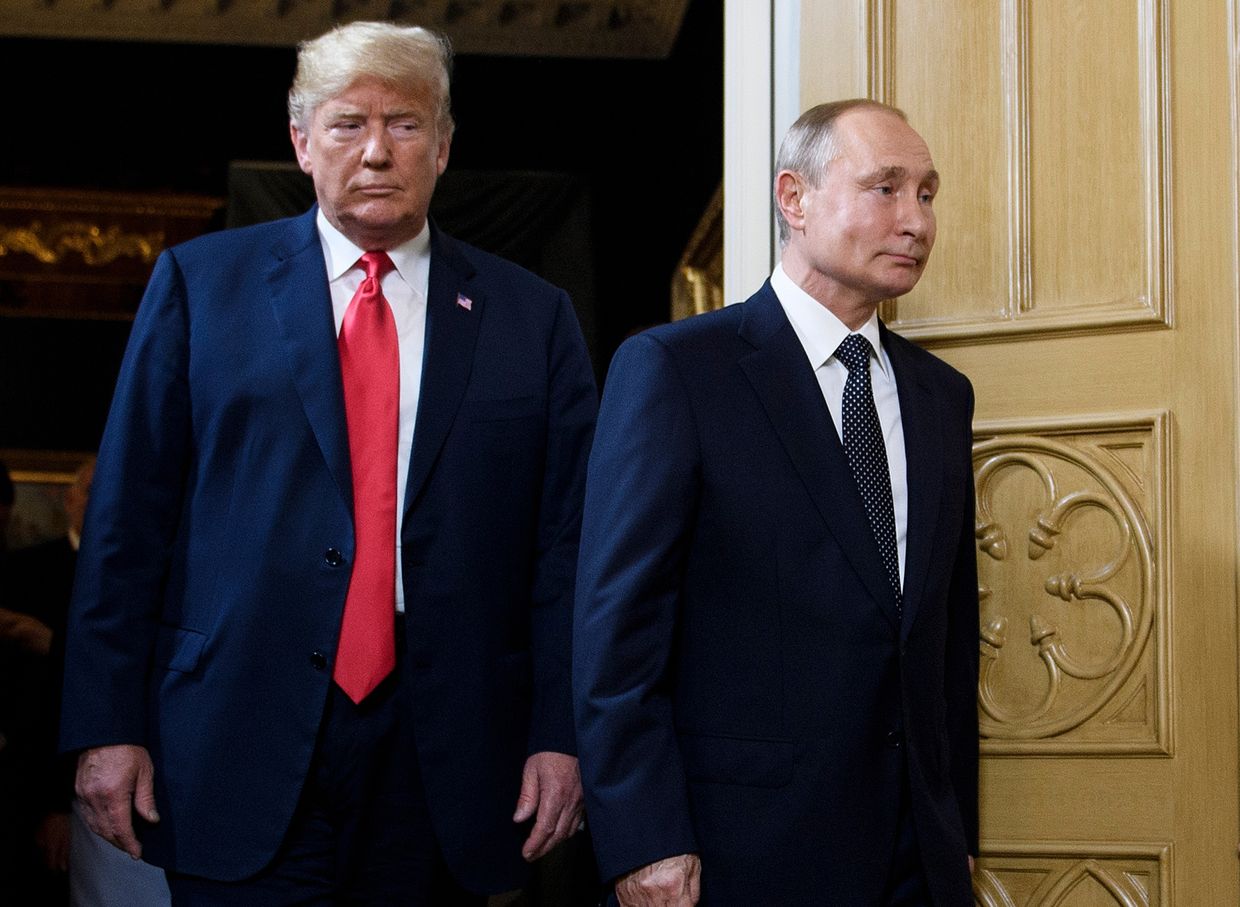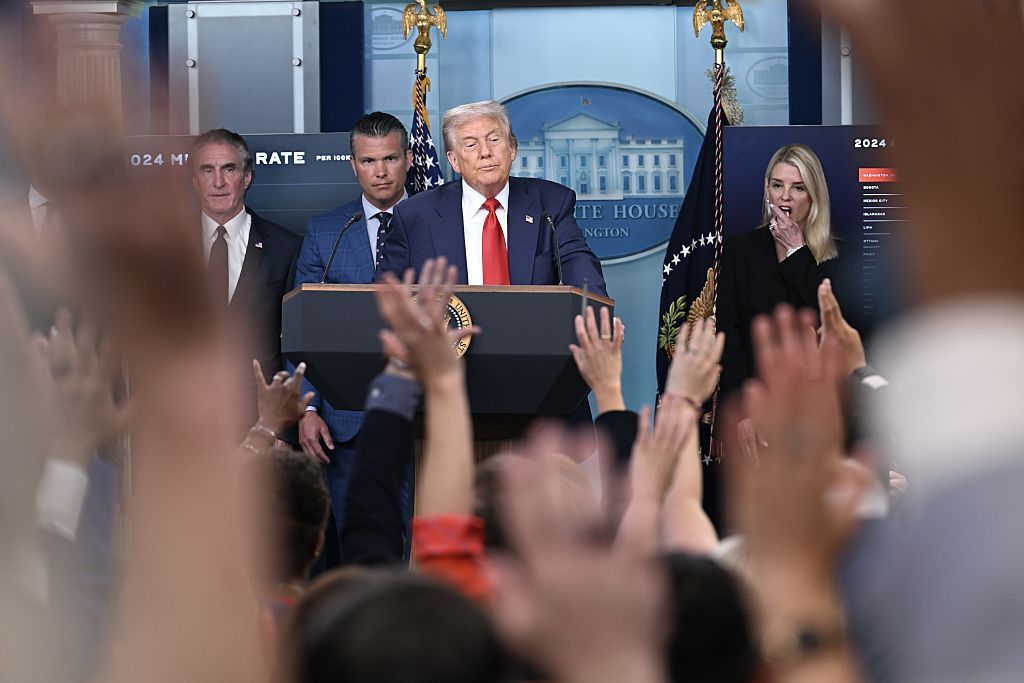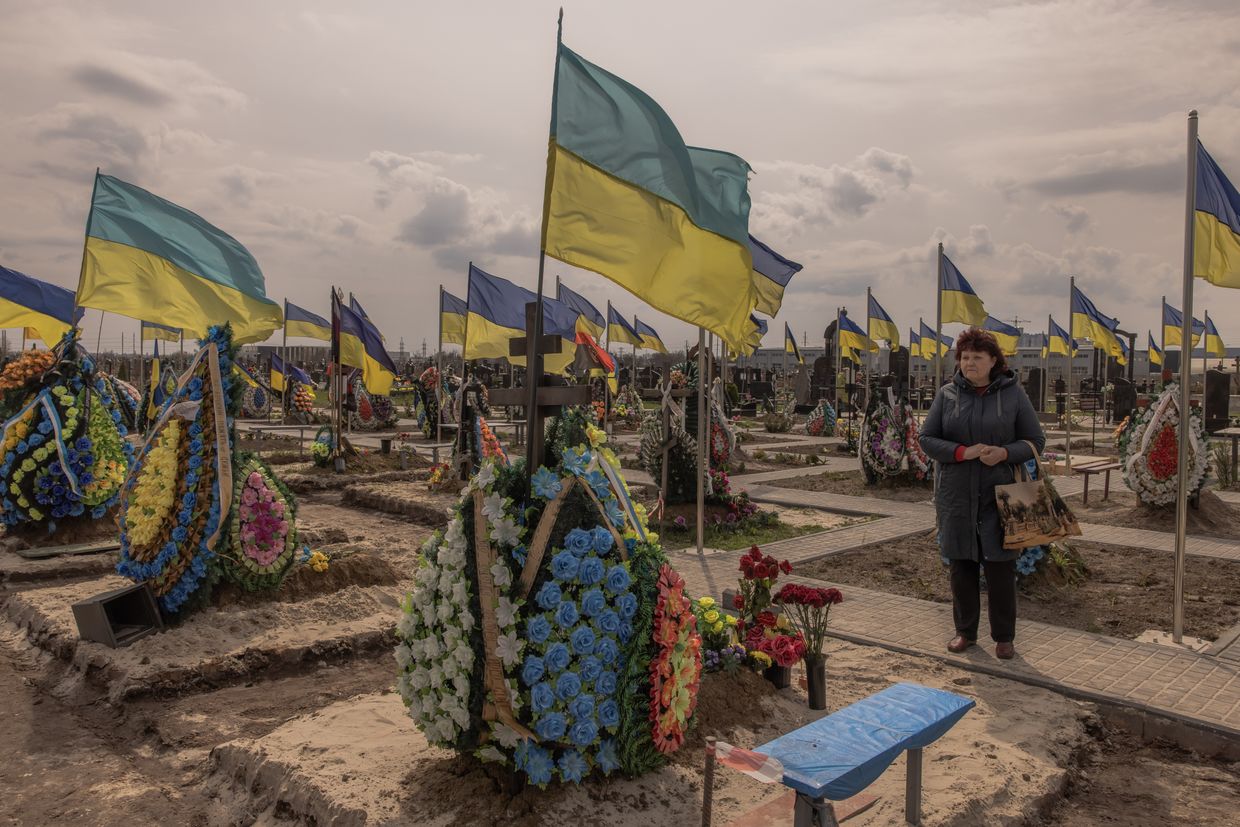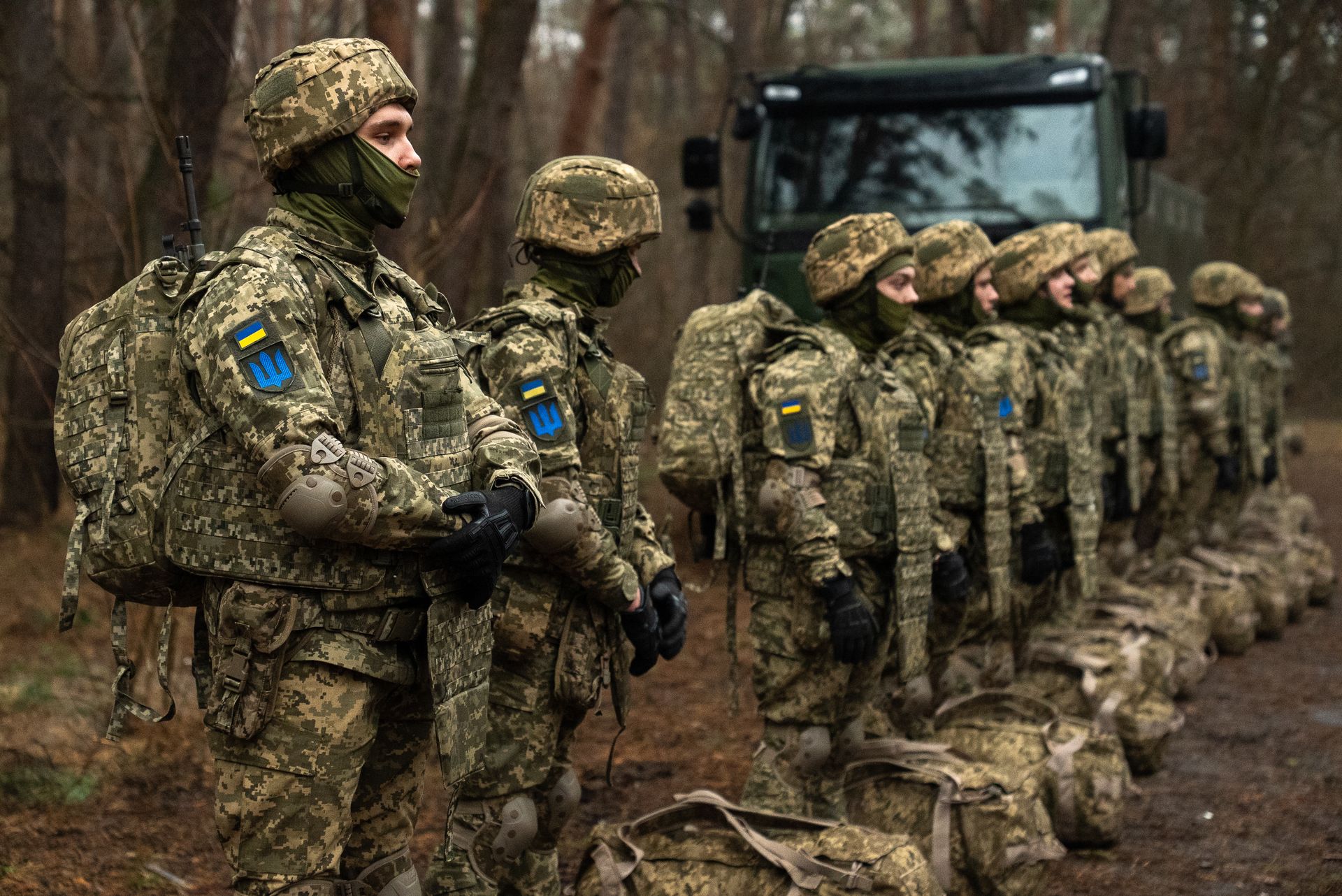Breakthrough unlikely at Putin-Trump meeting as US, Russia, Ukraine differ on key issues
'I may leave and say good luck, and this is not going to be settled,' U.S. President Donald Trump says.

U.S. President Donald Trump (R) attends a meeting with Russian President Vladimir Putin (L) during the G20 summit in Osaka, Japan, on June 28, 2019. (Brendan Smialowski/AFP via Getty Images)
As U.S. President Donald Trump and his Russian counterpart, Vladimir Putin, prepare for a bilateral meeting on Aug. 15 in Alaska, the aims of the U.S., Russia, and Ukraine appear to contradict each other.
"At the end of that meeting, probably in the first two minutes, I'll know exactly whether or not a deal can be made," Trump told reporters on Aug. 11.
Experts say the hastily organized summit will most likely fail to bring Trump, Putin, and President Volodymyr Zelensky to an agreement on a full ceasefire, let alone a peace deal.
Russia has repeatedly voiced maximalist demands, such as de jure recognition of illegally annexed Ukrainian territories and withdrawal of Ukrainian troops from areas that the country still controls.
At the meeting with Trump, Putin is set to propose that Kyiv withdraw its troops from Donetsk and Luhansk oblasts, according to a source in Ukraine's President's Office who spoke on condition of anonymity. According to the proposal, Russia would then withdraw its troops from Kharkiv and Sumy oblasts.
Kyiv has agreed to an unconditional ceasefire but has categorically rejected any demands for recognizing the annexations or withdrawing its troops from Ukrainian soil.
According to the source in Ukraine's President's Office, Putin's proposal would be outright rejected by Ukraine.
Meanwhile, the Trump administration has vacillated between trying to appease the Kremlin and expressing frustration with Putin's refusal to agree to a ceasefire.
Trump has become more hawkish on Russia in recent months, imposing a tariff on India for buying Russian oil and approving weapons sales to Ukraine.
"Faced with Trump's deadline, Putin is again playing for time, and is likely to use a meeting to sway Trump to Russian views."
However, analysts say that the upcoming meeting between Putin and Trump may trigger another policy reversal, with the U.S. again attempting to impose the Kremlin's conditions on Kyiv.
Daniel Hamilton, a foreign policy expert at the Brookings Institution, said that "extreme caution is warranted about any Putin-Trump meeting, which is unlikely to produce anything remotely acceptable to Ukraine."
"Faced with Trump's deadline, Putin is again playing for time, and is likely to use a meeting to sway Trump to Russian views," he told the Kyiv Independent. "The meeting could result in another delay in U.S. sanctions on Russia, and further hesitations by Trump to offer further support for Ukraine."
Ryhor Nizhnikau, a Russia expert at the Finnish Institute of International Affairs, said that "this Trump-Putin meeting can only delay the end of the war."
"Energy sanctions on China and India for buying Russia's oil and, more importantly, substantially increasing military aid to Ukraine are the best available tools against Russia at the Western disposal," he told the Kyiv Independent.
"If Trump wants to use the summit with Putin to avoid keeping his word on the ultimatum (for Russia to agree on a ceasefire), that is bad news. It will only further embolden Moscow and Beijing to pursue their current course of action."
What does Putin want?
Putin has regularly voiced maximalist demands and rejected an unconditional ceasefire.
He has also demanded a ban on Ukrainian mobilization or training of troops and a halt on Western military aid for Kyiv.
During the Istanbul talks with Ukraine that sporadically took place from May to July, Russia demanded that Ukraine recognize the illegally annexed territories as Russian, withdraw from the Kyiv-controlled parts of these regions, and adopt a neutral status, according to a source in the President's Office who spoke with the Kyiv Independent on condition of anonymity.
Russia illegally annexed Ukraine's Crimea peninsula in 2014. The Kremlin also announced the illegal annexation of Ukraine's Kherson, Zaporizhzhia, Donetsk, and Luhansk oblasts in 2022 despite only partially controlling them.
Reuters reported in May, citing its sources, that Putin was also demanding a written pledge by NATO not to accept more Eastern European members and the lifting of several sanctions as conditions for ending Russia's war in Ukraine.
Nizhnikau said that, by agreeing to meet the U.S. president, Putin is buying "time for himself and for Trump, thus potentially also making Trump a favor of finding a way to avoid fulfilling his ultimatum threats."
"Trump will be looking for a deal, and Putin will be looking for ways to avoid a deal unless it is entirely on Russia's terms."
"I do not expect any breakthrough on the ceasefire," he told the Kyiv Independent. "There is the same major question to ask: has Putin's stance on the war changed? The answer is no; nothing changed, and he wants to continue the war. Putin's plan is to buy a bit more time and ideally again shift at least some blame back on Ukraine, which would permit him to avoid any serious harshening of the U.S. approach towards Russia."


Richard Betts, professor emeritus of war and peace studies at Columbia University, argued that "Putin probably hopes that he can once again make the gullible Trump believe that they have a common goal and that soothing rhetoric may induce Trump to back away from stronger sanctions."
"There are no obvious indications that Putin is rethinking his strategy of grinding Ukraine down through attrition while accepting moderate but bearable pain for Russia from Western sanctions," he added.
Meanwhile, Jenny Mathers, a lecturer in international politics at the U.K.'s Aberystwyth University, argued that she expects Putin to "repeat his laundry list of demands and to seize on any suggestion from Trump that any of Russia's demands should be the basis for negotiations or a peace deal."
"Putin cares a lot about the details and will be very careful not to commit to anything that he thinks will disadvantage Russia," she added. "Putin is almost certainly delighted at the prospect of a personal meeting with the U.S. president, breaking the Western isolation that (ex-U.S. President Joe Biden's) administration tried to impose. But while both Trump and Putin will value the photo ops and the immediate publicity around such a meeting, Trump will be looking for a deal, and Putin will be looking for ways to avoid a deal unless it is entirely on Russia's terms."
John Herbst, an expert at the Atlantic Council and a former U.S. ambassador to Ukraine, also argued that Putin has no desire to accept a full ceasefire but could offer a small gesture that would satisfy Trump. One option is a partial ceasefire in the air, he added.
Bloomberg reported on Aug. 5, citing undisclosed sources familiar with the matter, that the Kremlin was weighing a proposal to pause its long-range strike campaign in Ukraine as a potential concession to Trump.
What does Trump want?
On Aug. 11, Trump said he invited Putin to the U.S. to hear what he has to say following the U.S. threat to impose secondary tariffs.
"I may leave and say good luck, and this is not going to be settled," he said, adding that he believes Putin wanted "all of Ukraine."
"I'm not going to make a deal; it's not up to me to make a deal," Trump said, adding that he would consult with European allies and Zelensky immediately after the meeting.
After taking office in January, Trump has attempted to end Russia's war against Ukraine by pressuring Kyiv into accepting concessions, embracing Kremlin narratives and talking points.
In recent months, however, he has become tougher on Moscow.
In July, Trump set an Aug. 8 deadline for Putin to end hostilities or face secondary tariffs on countries buying Russian oil, such as China and India.
On Aug. 6, he slapped a 25% tariff on India over its purchases of Russian oil. The tariff is expected to come into effect on Aug. 27.
However, no secondary tariffs have been imposed on China or other countries buying Russian oil.
U.S. Secretary of State Marco Rubio said on Aug. 6 that Trump would decide whether to impose any other secondary tariffs on Russia's trading partners within the next 24 to 36 hours. However, Trump has not imposed any new tariffs as his Aug. 8 deadline passed, despite Putin's refusal to halt the war.

The Trump administration was also considering new sanctions on Russia's so-called "shadow fleet" of oil tankers should Putin fail to agree to a ceasefire in Ukraine by Aug. 8, people familiar with White House discussions told the Financial Times (FT). However, no such sanctions were imposed as the deadline passed.
As Trump is hesitant to introduce more sanctions or tariffs, doubts persist on whether a ceasefire is possible.
"Now he (Trump) plays a 'tough guy' but both Moscow and Beijing have a belief that his 'toughness' has no substance and that he will chicken out in the end."
Herbst argued that the only way to force Putin to agree to a full ceasefire would be to apply "enormous pressure" and "sanction the hell out of Putin."
Trump's apparent toughness in recent months is also easily reversible, experts say.
Nizhnikau said that Trump "is obviously tougher (on Russia) than he was before."
"But so far the main changes have been rather rhetorical," he added. "Now he plays a 'tough guy' but both Moscow and Beijing have a belief that his 'toughness' has no substance and that he will chicken out in the end."
Mathers said that "there are plenty of things that Trump could do if he really wanted to put pressure on Putin — starting with flooding Ukraine with weapons and making it clear that Ukraine is welcome in NATO, and sooner rather than later."
"But there are no signs that Trump is thinking along those lines. Instead, he offers Putin more and more chances," she added.
There are also concerns that Trump may soften his stance on Russia again.
"The question is whether Trump, who has always been impulsive and inconsistent, will reverse course again and soften his recently tough position regarding Moscow," Betts said. "His erratic record gives no reason to be confident in any prediction of which way he will tilt."
Analysts say that Trump's planned meeting with Putin is a face-saving gesture.
"(Trump) wants to make an appearance that he is doing everything to end the war," Nizhnikau said. "Trump needs a way out of his own ultimatum trap. His threats on China, India and Russia brought no result, and I think Trump does not really want to fulfill them. So now he is looking for ways to avoid or postpone fulfilling ultimatum threats without denting his reputation."
Mathers believes that "Trump doesn't really care about the details but just wants a win that he can present as proof of his ability to deliver on promises and of his dealmaking skills."
"Trump thinks of himself as the ultimate dealmaker, and that he personally can solve otherwise intractable problems, so he probably expects that he can achieve a breakthrough that none of his officials could pull off," she added.
Stefan Wolff, professor of international security at the University of Birmingham, argued that Trump "appears to show that he has leverage and seems prepared to use it."
"But this is not a tactic aimed at hurting Russia, let alone punishing it for the aggression against Ukraine, but rather a way of getting to a deal with Putin that favors America," he said.
"A bilateral meeting between Putin and Trump would primarily be about U.S.-Russia relations. A ceasefire for Ukraine and/or a timeline towards further peace negotiations would only be of instrumental value for the two leaders as they are attempting a reset of their relations."
What does Ukraine want?
So far, Ukraine has shown more willingness to compromise.
Ukraine supported a U.S.-backed agreement on a full unconditional ceasefire in March but Russia rejected it.
At the same time, Ukraine has repeatedly rejected proposals on recognizing any of the occupied territories as Russian de jure.
On Aug. 9, Zelensky again rejected the idea of ceding any Ukrainian territory to end Russia's war, following Trump's statement of a possible territorial "swapping."
"Russia has expressed its 'desires' — rejection of NATO (membership for Ukraine), recognition of the occupied territories, and so on," Yaroslav Yurchyshyn, a lawmaker from Ukraine's opposition party Holos, told the Kyiv Independent. "The real key interest (for Moscow) is the lifting of sanctions. These demands are unacceptable for Ukraine; we are interested in an all-for-all (prisoner) swap and a complete cessation of hostilities."
"Ukraine wants to survive."
Ukraine has also sought security guarantees from the West, but so far, the U.S. and Europe have been reluctant to provide them.
"Ukraine wants to survive," Oleksandr Merezhko, head of the Ukrainian parliament's foreign affairs committee, told the Kyiv Independent. "It wants real, reliable guarantees of our survival and our security... NATO membership, first of all, yes, is the best security."

However, the U.S. and NATO have so far refused to greenlight Ukraine's potential membership in the alliance.
Kyiv has also called for new military aid from NATO countries, but the record has been mixed.
The U.S. halted military aid packages approved under Biden twice — in March and July — and the Trump administration was initially reluctant to approve any new military aid.
However, recently, Trump has softened his stance on supplying weapons to Ukraine.
On July 14, Trump announced an initiative under which other NATO members would purchase U.S.-made weapons systems for Ukraine.
However, Kyiv is concerned that Trump may fall into Putin's trap again during the planned meeting with the Russian leader.
"I'm not happy that (a potential trilateral meeting will be) preceded by a bilateral meeting between Trump and Putin," Merezhko said. "I think it's a diplomatic and political mistake because… Putin might impose his agenda for negotiations on Trump."
He argued that "there are already signs of that, because... Putin wants to talk about 'territorial swaps.'"
"It's already an indication that he's trying to impose his agenda on Trump, which narrows our field for maneuvering and possibilities," Merezhko continued. "I think that it would make more sense to have a trilateral meeting instead of a bilateral one because otherwise it might look as if the U.S. and Russia have made arrangements about Ukraine without Ukraine."
Mykola Bielieskov, a research fellow at the National Institute for Strategic Studies and a senior analyst at Ukrainian NGO Come Back Alive, also said that "there is always a risk that Russia would try to promote its formulae of settlement."
He added that this "would undermine Ukrainian sovereignty and security and thus make such a deal unacceptable to us while playing a blame game that Ukraine is a major obstacle for peace and thus creating a rift between Ukraine and the U.S. to exploit."
"Thus, Ukraine, along with its European partners, jointly tries to warn Donald Trump that any deal should not be based on Russian terms where Ukrainian sovereignty and security are compromised," Bielieskov added.














